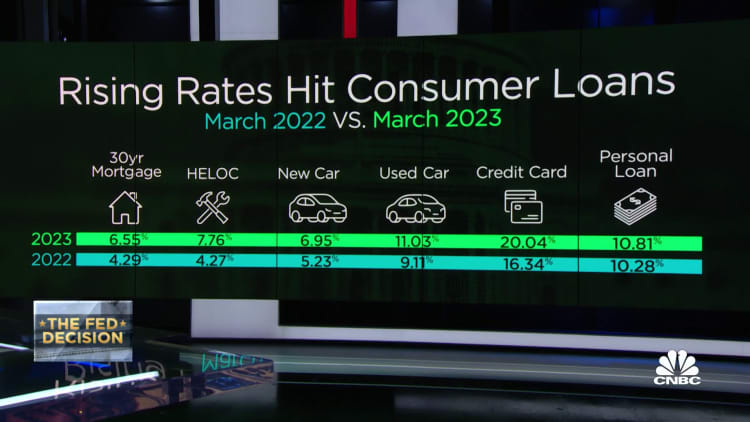When Marcus Johnson drove his Suzuki Swift out of a dealership in south Wales in 2017, he had no idea that he was helping to precipitate another major UK financial scandal.
The 34-year-old factory supervisor from Cwmbran tells the Financial Times he was “in and out of the place within an hour” having put down a £100 deposit and signed a loan agreement to fund the rest of the £6,499 sticker price. The £154 monthly cost seemed in line with what some of his friends were paying.
What he did not realise was that a big chunk of the interest he was being charged was to fund a £1,650 commission — a quarter of the vehicle’s purchase price — to the Cardiff-based dealership for arranging the loan.
Seven years later, his case and two others led to a landmark Court of Appeal ruling that could have significant implications for the UK’s banking sector and even its economy.
In it, three judges concluded that Johnson did not understand “what a very poor deal he was getting” and had not given his informed consent to the payment, which they deemed unlawful. Dealerships had a fiduciary duty to act in the interests of their customers when arranging financing, they found.
The decision, which also covered car purchases by a postman in Stoke-on-Trent and a student nurse in Hull, “was like a bomb going off in the consumer finance sector”, says Julius Grower, a professor at the University of Oxford specialising in commercial law.
“It is an Erin Brockovich moment,” he adds, referring to the 1990s lawsuit against a big utility company that inspired the film of the same name, starring Julia Roberts.
Charlie Nunn, chief executive of Lloyds Banking Group, has described the ruling as “at odds with the last 30 years of regulation”. By some estimates, it could leave the sector facing a compensation bill approaching that of the £50bn payment protection insurance scandal.
It has also wrongfooted the UK’s financial regulator, which had been investigating hidden commissions in car finance. Car dealers say that it threatens their viability, while the wider finance industry has warned that it could lead to credit becoming less readily available and more expensive, curtailing people’s ability to buy high-value consumer goods.
Stephen Haddrill, head of the Finance & Leasing Association trade body, told a House of Lords committee in November that fears of “compensation being paid going back 20-plus years” would further reduce lending to the poorest people in society, which had already contracted 30 per cent in the past five years.
The Supreme Court is due to review the judgment in April. If upheld, millions of people who bought cars in Britain over the past two decades could claim back the cost of commissions and the interest they paid on them. Johnson says he has already received £3,200 from MotoNovo, a specialist car finance company owned by South Africa’s FirstRand Bank.
Estimates of the total cost to the banks that pay the commissions vary; RBC Capital Markets has suggested £17.8bn but analysts at HSBC believe the eventual bill could reach £44bn.
“The tentacles of this could be very long,” agrees Matt Austen, a former official at the UK’s Financial Conduct Authority who now works at consultancy Kroll.
The share prices of car dealers, financiers and lenders most exposed to car loans have already been hit. Close Brothers, a 146-year-old City of London merchant bank that has a fifth of its loan book in car finance, suffered a 70 per cent drop in its share price last year.
Some worry the controversy will harm the UK’s already fraying reputation among international investors. Nunn of Lloyds told an FT event last month that the court ruling had created an “investability problem” and that investors “are telling us they’re really concerned”.
The FCA, the UK’s main financial watchdog, has also come under fire because for many years its rules seemed to allow practices that courts now judge to have been unlawful.
The regulator recently extended an eight-week deadline for lenders to deal with complaints about car finance until December 2025 while it decides what to do, but has said an industry-wide redress scheme is likely to be imposed on the banks.
The ruling has left many in the motor trade bemused. “A fiduciary duty is what a lawyer owes to their client,” says FLA head Haddrill. “No car dealer really thinks that is quite how the relationship works [but] the regulatory regime has not recognised what the Court of Appeal says the law is — so we are operating in an uncertain environment.”
The origins of what the chair of the UK parliament’s influential Treasury select committee has described as “one unholy mess” go back decades.
Typically, car dealerships not only sell vehicles but also arrange financing; around 83 per cent of new car purchases were bought using such loans in the year to October, according to the FLA.
In exchange for introducing buyers, dealerships usually earn a commission from the lender. As online comparison sites such as Auto Trader have made car valuations more transparent, profits from buying and selling cars have been squeezed and dealerships have become more dependent on payments for arranging finance.

“Without commissions, nine out of ten dealerships would go bust almost immediately,” says Richard Szabo, co-founder of the TT Sports & Prestige car dealership in Derby. Surveying dozens of luxury cars parked in his showroom, he argues that “almost all customers know about us receiving a commission. It would be a surprise if we were not.”
In 2017, Szabo’s dealership sold a BMW to Andrew Wrench for £9,750 in another case ruled on by the Court of Appeal. The company earned just over £400 for arranging a loan from FirstRand to finance the purchase by Wrench, who was described by the court as “a postman with a penchant for fast cars”.
Szabo maintains that his customer got “a good deal” with an interest rate of 4.3 per cent and says he does not understand why the loan was ruled unlawful.
In the same year that Wrench acquired his BMW, the FCA announced a review of car finance. Its inquiry found that about half of all commissions paid by car finance companies were “discretionary”. They allowed dealerships to adjust the interest rate on loans for customers — and the higher the rate, the more commission the dealer earned.
Officials estimated that customers buying through such discretionary models were paying £300mn more a year on their car loans than if dealerships had only been receiving a flat commission. Warning of “consumer harm on a potentially significant scale”, the FCA decided to ban all discretionary commissions from January 2021.
Hundreds of thousands of complaints about car finance poured into lenders. Jenna Lewis submitted one of them after she realised that the Liverpool branch of the Arnold Clark dealership had jacked up the interest rate on a £13,333 loan for her purchase of a second-hand Audi in 2018 from a minimum of 2.68 per cent to 4.67 per cent.

The increase cost her an additional £1,326.60 in interest, which was paid to the dealership as a commission by Barclays — and represented a fivefold increase on its usual payment.
The banks rejected almost all such complaints, including Lewis’s. She and others then turned to the Financial Ombudsman Service, which resolves disputes involving the sector. The FOS said it received more than 42,000 submissions about car loans in the year to September 2024 — nearly treble the previous year.
It found in Lewis’s favour, saying Barclays had not acted “fairly and reasonably” and had breached both the FCA’s rules and the Consumer Credit Act.
The bank challenged the decision in the High Court, but the judge sided with the FOS, declaring that the only way for Barclays to have avoided “unfair treatment” of Lewis was with “full and complete disclosure” on the structure and amount of commission it paid the dealership at her expense. Barclays has indicated it will appeal against the ruling.
Similarly, Johnson had signed documents that made reference to the possible payment of a commission but had not read what he described as “an enormous amount of paperwork”, which he had been asked to sign on the spot. “It was quite rushed — it did feel like quite high pressure,” he recalls.
The Court of Appeal judges said that “burying such a statement in the small print which the lender knows the borrower is highly unlikely to read will not suffice”.

To the alarm of lenders, lawyers acting for claimants are now pushing for a lot more than just repayment of the disputed commission. “The Court [of Appeal] said the firms have to pay back the commission and the interest paid on the original loan — it’s double recovery — which is unusual in English law,” says Oxford’s Grower.
“It feels very disproportionate and extreme. But there is a well-known history of courts in this country giving a win to the small guy and a poke in the eye to the big banks.”
Putting lenders on the hook for repaying all the interest on the loan potentially adds billions more pounds to the eventual compensation bill.
“You are looking at unwinding the [loan] agreement — it engages rescission,” says Kevin Durkin, a lawyer at HD Law who acted for Johnson. That is “what’s really sent shockwaves” through the industry.
Lawyers say it is far from clear how rescission would work in practice, however.
Any calculation of damages would have to include the value to the consumer of using — and, if the loan is paid off, owning — the car, a concept known in law as “counter restitution”.
Such a calculation could be even more complicated if the borrower had since sold the car. Caroline Edwards, partner at law firm Travers Smith, says it “will be necessary to give back the benefits received under the contract, which may not be straightforward to determine”.
Johnson’s claim was considered a “partial disclosure” case, in which the possibility of commission had been referenced in the documents that he signed. In such cases, rescission is at the discretion of the court, and Johnson was not awarded it, in part because he had since sold the vehicle.
However, Durkin of HD Law says customers in cases such as Wrench’s, where the commissions were not disclosed sufficiently clearly, or at all, are entitled to rescission as a right under previous case law. “There’s a long line of [judicial] authority on rescission,” he notes.
The recent court rulings upholding complaints against the banks are expected to trigger a flood of further complaints. “Claimant law firms and litigation funders are mobilising following the Court of Appeal decision, leading to yet more litigation,” says Kenny Henderson, partner at law firm CMS.

There are also concerns that swaths of the consumer credit market could be affected. Commissions have long had to be fully disclosed in some areas, such as for any above £250 paid to mortgage brokers for arranging home loans. But the rules are less clear elsewhere. “Since the decision we’ve had lots of discussions with clients about the extrapolation risks,” says Kate Scott, a partner at law firm Clifford Chance.
Companies in several sectors were examining if they needed to improve their disclosure of commissions, such as those earned for arranging loans on the sale of electrical goods like fridges and televisions, or for insurance where people pay for cover in monthly instalments rather than up front, she adds.
Martin Lewis, the UK’s most high-profile consumer champion, says more than 2.5mn people have already complained to their car finance provider over discretionary commissions using an email template on his Money Saving Expert website.
He estimates that the number of people who could potentially complain doubled after the Court of Appeal ruled that flat commissions were also illegal if they were not fully disclosed and the customer did not give clear consent.
But he told viewers of his ITV show last month that he was less convinced about the merits of seeking redress for flat commissions that were not fully disclosed. “If retrospective payback is ordered it could be counterproductive . . . we may see less availability of car finance and we may see higher prices.”
Banks have started to make provisions against likely redress claims. Lloyds, the UK’s biggest car finance provider, has set aside £450mn while the UK unit of Spain’s Banco Santander has booked a £295mn charge and FirstRand bank took a R3bn (£130mn) hit.

Credit rating agency Moody’s said bigger banks and the lending arms of major carmakers should be able to absorb the cost of redress quite easily. But smaller banks such as Close Brothers, Paragon and Investec, risked “a more significant hit to profitability and capitalisation”.
Some banks stopped providing car loans for several days after the ruling while they rewrote the documentation and scripts they gave to dealerships to clarify the size of any commissions and require consumers to give their full consent. Three lenders switched to a zero-commission model.
But as lawyerly debate rages ahead of the Supreme Court case, disclosing more detail about commissions has made “little difference” to customers on the ground, says Jason Booth, manager of Bristol Street Motors dealership on the same industrial estate in Derby as TT Sports & Prestige.
He now times all his sales staff to ensure they spend at least 30 seconds explaining its commissions to customers but says the extra detail is yet to put off potential buyers other than at the premium end of the market.
“Most people just care about what their monthly payments will be,” he says.
Additional reporting by Akila Quinio
































